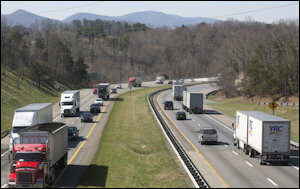
The Commonwealth of Virginia has done some smart things in recent years regarding transportation policy. It has established the Smart Scale system for objectively ranking transportation projects. And it has reformed its Public Private Partnership process for attracting private-sector investment without giving away the store. But the assortment of taxes used to fund the state’s streets, roads, highways, and mass transit systems remains an incoherent hodgepodge of subsidies and cross subsidies that only remotely abide by the user-pays principle.
Governor Ralph Northam and the General Assembly kinda sorta took a step in the right direction yesterday by agreeing to new taxes to raise money for congestion-relief projects along Interstate 81, the transportation spine of western Virginia. But we can do better. It’s time for Virginia to seriously consider a Vehicle Miles Traveled (VMT) tax to cover the maintenance cost of the state’s roads, bridges and highways.
Under Northam’s amendments, tractor-trailer registration fees will increase later this year and the diesel tax will increase to 2.03% of the statewide average average wholesale price per gallon. That make sense. Freight carriers dominate traffic on I-81 and they account for disproportionate wear and tear on the highway. Also, according to the Roanoke Times, revenues will be distributed on the basis of truck miles traveled on Interstate highways between the I-81 Corridor Improvement Fund and other interstate projects around the state. Additionally, the gas and diesel tax will increase by way of a 2.1% wholesale tax in the I-81 corridor. All of those revenues will go directly to I-81 improvements.
Of the total $280 million these amendments would raise annually, I-81 will receive about $150 million. The funding can be leveraged through bonds to support $2 billion in projects.
It’s not a perfect arrangement, but at least there is a rational nexus between where the money comes from and where it’s being spent.
We’ve been down the transportation-funding road before. Governor Bob McDonnell pushed through a major increase in transportation funding, relying heavily on a general sales tax, with the hope that it would be the last tax increase needed for a generation. That didn’t work out as expected. And you can be sure that yesterday’s tax increase won’t be the last time politicians say some new priority desperately needs funding and that we have to raise taxes again.
Transportation is a bottomless pit. One reason it is a bottomless pit is that, overall, there is only a tangential connection between what Virginians pay into the system and how much — and when — they drive. Everyone pays a sales tax, whether they ride bicycles, take the bus, or drive solo to work. Everyone pays a vehicle sales tax, whether they drive 5,000 miles a year or 25,000. Owners of newer fuel-efficient cars pay less gasoline tax per vehicle mile traveled than owners of old clunkers.
The other reason transportation is a bottomless pit is because Virginia localities continue to make irresponsible land use decisions knowing that, in most cases, the state is responsible for dealing with the traffic generated. Localities get extra tax revenue from real estate development; the state gets the liability of building and maintaining streets and roads.
And don’t get me started on mass transit funding, which, as far as I can see, hews to no known user-pays logic. If roads and highways are a bottomless pit, the Washington Metro system is a black hole.
A few days ago, I laid out some basic principles for funding I-81. Here, I would like to take those principles from the abstract to the concrete. One huge step toward an economically rational (and politically palatable) transportation funding system would be to scrap all the wholesale, retail, gasoline, and diesel taxes and replace it with a VMT tax dedicated to funding maintenance and operations.
Everyone can grasp, and see the fairness in, the principle that all vehicles should pay their share of the maintenance and operations of roads and highways. The more you drive, the more you pay. The heavier the vehicle, the more you pay. Money you pay into the maintenance fund stays in your region — it doesn’t get siphoned off to another part of the state. The tax per mile is determined by the cost of maintaining roads, bridges, and highways to a state of good condition. If the cost of maintenance goes up, the tax goes up commensurately. If the Virginia Department of Transportation can find ways to drive maintenance costs down, then the tax goes down commensurately.
That still leaves the issue of how we pay for new construction projects and how we reform land use. Those issues are more complex and warrant separate posts. But we can simplify that tangled mess if we take the maintenance factor out of the picture. The fact that lawmakers adopted a quasi-user pays tax for I-81 is encouraging. One can only hope they will apply the same logic to the rest of Virginia’s transportation funding system.

Leave a Reply
You must be logged in to post a comment.